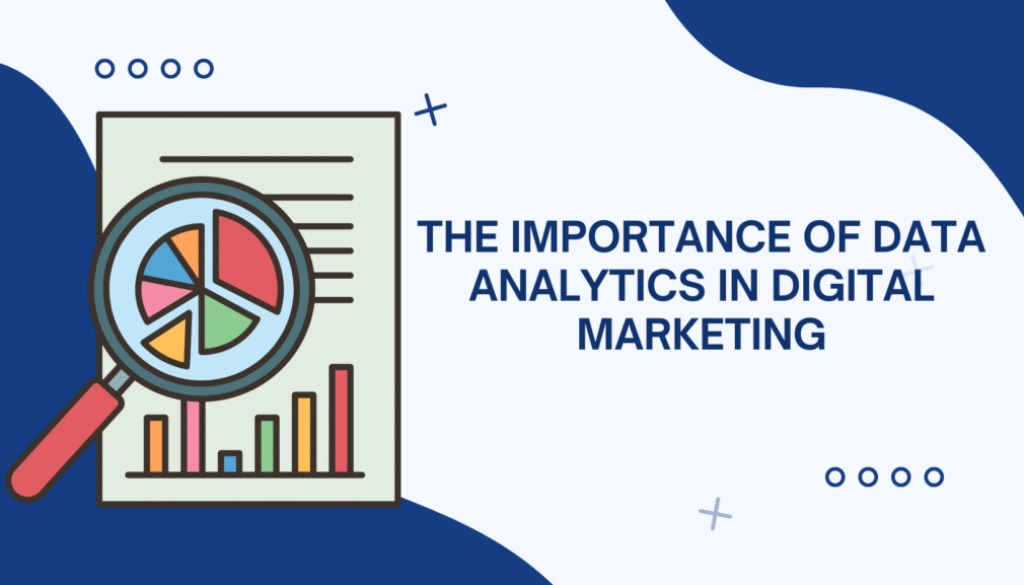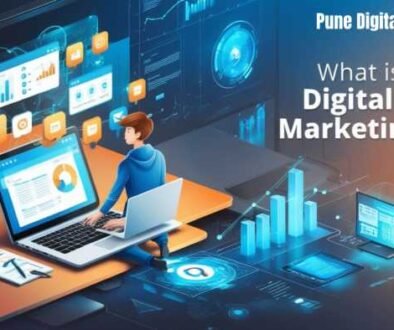The Importance of Data Analytics in Digital Marketing
In today’s fast-paced and highly competitive business landscape, digital marketing has become a cornerstone of success for most brands and enterprises. As consumers increasingly rely on digital platforms for information, entertainment, and shopping, businesses must adapt their marketing strategies to meet these digital-first behaviours. Central to this transformation is data analytics, a powerful tool that helps marketers understand consumer behaviour, optimize strategies, and make data-driven decisions.
In this article, we’ll explore why data analytics is so important to digital marketing and how businesses can leverage it to drive better results. Along the way, we’ll also discuss how data analytics can be integrated into digital marketing strategy planning and how aspiring marketers can benefit from digital marketing courses in Pune to acquire these essential skills.
The Evolution of Digital Marketing and the Role of Data Analytics
Digital marketing has evolved dramatically over the past two decades, shifting from basic websites and email campaigns to a complex ecosystem that includes social media marketing, search engine optimization (SEO), paid advertising, content marketing, and more. With this evolution came the need for more sophisticated tools to measure the effectiveness of marketing efforts.
Gone are the days when marketers could rely solely on gut feeling and broad assumptions. Today’s marketers need to track every click, view, and conversion to fine-tune their efforts and stay ahead of the competition. This is where data analytics comes into play.
Data analytics is the process of examining datasets to draw meaningful conclusions about the information they contain. In the context of digital marketing, this means analyzing consumer behaviour, engagement patterns, and the performance of marketing campaigns. By leveraging data analytics, marketers can make informed decisions about where to allocate resources, which channels to prioritize, and how to improve their strategies over time.
Why Data Analytics is Crucial in Digital Marketing
- Personalization of Marketing Campaigns
One of the most significant advantages of using data analytics in digital marketing is the ability to personalize campaigns. Consumers today expect brands to deliver tailored experiences, and data analytics allows marketers to achieve this by tracking user behaviour and preferences.
For example, by analyzing data from website visits, email interactions, and social media activity, businesses can segment their audience into specific groups and create personalized content for each segment. Whether it’s personalized email campaigns or targeted social media ads, data-driven personalization can significantly improve engagement rates and conversions.
- Improving Customer Experience
Customer experience is at the heart of successful digital marketing strategies. When brands understand their customers’ needs and pain points, they can create more meaningful interactions. Data analytics helps businesses monitor and optimize the customer journey by tracking every touchpoint, from the first interaction to the final conversion.
For instance, using website analytics tools, marketers can identify pages with high bounce rates and improve them to enhance the user experience. Similarly, by analyzing social media engagement data, marketers can adjust their content strategy to better align with what their audience finds valuable.
- Enhancing Decision-Making
One of the most valuable aspects of data analytics is its ability to inform decision-making processes. In the past, marketing decisions were often based on intuition or limited information. With data analytics, marketers can make evidence-based decisions that lead to better outcomes.
For example, a business launching a new product can use data analytics to determine the most effective digital channels for promotion. By analyzing past campaign performance, demographic data, and consumer behaviour trends, marketers can develop a more focused and effective digital marketing strategy planning.
- Optimizing Marketing Spend
Digital marketing can be costly, especially when businesses invest in paid advertising campaigns. Without proper oversight and optimization, marketing budgets can quickly spiral out of control. Data analytics helps marketers track return on investment (ROI) in real-time, allowing them to adjust their strategies and allocate budgets more efficiently.
For example, businesses can use Google Analytics or other analytics tools to monitor the performance of paid ads and identify which keywords or ad creatives are driving the most conversions. This enables them to optimize their ad spend by focusing on high-performing campaigns while eliminating underperforming ones.
- Predictive Analytics and Future Trends
Data analytics is not just about understanding past behaviour; it also helps businesses predict future trends. Predictive analytics uses historical data to forecast future outcomes, enabling marketers to anticipate changes in consumer behaviour and market dynamics.
For instance, by analyzing seasonal trends or shifts in consumer preferences, businesses can adjust their marketing strategies accordingly. Predictive analytics can also help marketers identify emerging opportunities or potential challenges, allowing them to stay ahead of the competition.
Key Metrics and Tools in Data Analytics for Digital Marketing
To effectively leverage data analytics in digital marketing, it’s essential to focus on the right metrics and use the appropriate tools. Here are some key metrics and tools that every digital marketer should be familiar with:
- Website Traffic and User Behaviour
- Tools: Google Analytics, Hotjar
- Metrics: Pageviews, bounce rate, average session duration, user flow
Understanding how visitors interact with your website is crucial for optimizing the user experience and driving conversions. Google Analytics provides a wealth of information about website traffic, user behavior, and conversion rates, while tools like Hotjar can help visualize user activity through heatmaps and session recordings.
- Social Media Engagement
- Tools: Facebook Insights, Twitter Analytics, Hootsuite, Sprout Social
- Metrics: Likes, shares, comments, impressions, engagement rate
Social media platforms provide built-in analytics tools that help marketers track engagement metrics. Monitoring these metrics allows businesses to understand which types of content resonate with their audience and adjust their social media strategy accordingly.
- Email Marketing Performance
- Tools: Mailchimp, Constant Contact, HubSpot
- Metrics: Open rate, click-through rate (CTR), conversion rate, unsubscribe rate
Email marketing remains a powerful tool for nurturing leads and driving conversions. By analyzing email campaign performance metrics, businesses can refine their email marketing strategies to improve engagement and increase conversions.
- Paid Advertising Performance
- Tools: Google Ads, Facebook Ads Manager, SEMrush
- Metrics: Click-through rate (CTR), cost per click (CPC), conversion rate, return on ad spend (ROAS)
Paid advertising campaigns require constant monitoring and optimization to maximize ROI. Analytics tools help businesses track the performance of their ads and make data-driven decisions about budget allocation and creative optimization.
- SEO Performance
- Tools: Google Search Console, Ahrefs, SEMrush
- Metrics: Organic traffic, keyword rankings, backlinks, domain authority
SEO is a long-term digital marketing strategy that requires careful monitoring and adjustments. Tools like Google Search Console and Ahrefs provide insights into how well your website is performing in search engines and offer recommendations for improving your SEO strategy.
Integrating Data Analytics into Digital Marketing Strategy Planning
To fully harness the power of data analytics, businesses must integrate it into their overall digital marketing strategy planning. This involves not only collecting data but also interpreting it and applying the insights to drive better marketing decisions. Here’s how to incorporate data analytics into your marketing strategy:
- Set Clear Objectives and KPIs
Before diving into data analysis, it’s important to define clear objectives and key performance indicators (KPIs). Whether your goal is to increase website traffic, generate more leads, or improve conversion rates, having specific KPIs in place will help you measure the success of your marketing efforts and make data-driven adjustments.
- Use Data to Identify Audience Segments
One of the key benefits of data analytics is the ability to segment your audience based on demographics, behaviour, and preferences. By understanding the different segments within your target audience, you can tailor your marketing messages to resonate with each group.
- Optimize Content and Campaigns Based on Data Insights
Data analytics can reveal which types of content or campaigns are most effective in driving engagement and conversions. Use these insights to optimize your content strategy, ad creative, and messaging to ensure you’re delivering the most relevant and impactful content to your audience.
- Test and Iterate
Digital marketing is an iterative process, and data analytics plays a crucial role in optimizing campaigns over time. By continuously testing different strategies, analyzing the results, and making data-driven adjustments, businesses can improve their marketing performance and stay competitive in the ever-evolving digital landscape.
Upskilling with Digital Marketing Courses in Pune
As data analytics becomes increasingly important in digital marketing, there’s a growing demand for professionals who have the skills to analyse and interpret data effectively. For aspiring marketers or those looking to upskill, enrolling in digital marketing courses in Pune can be an excellent way to gain hands-on experience with data analytics tools and techniques.
Digital marketing courses in Pune often cover a wide range of topics, including SEO, social media marketing, email marketing, and paid advertising, with a strong emphasis on data analytics. These courses provide practical training in tools like Google Analytics, SEMrush, and HubSpot, allowing students to develop the skills needed to succeed in today’s data-driven marketing landscape.
Whether you’re just starting your digital marketing career or looking to enhance your skills, enrolling in a reputable digital marketing course in Pune can help you stay competitive and prepare for the future of marketing.
Conclusion
In the world of digital marketing, data analytics is not just a buzzword—it’s an essential tool for success. By leveraging data to understand consumer behaviour, optimize campaigns, and make informed decisions, businesses can stay competitive and achieve better results. Integrating data analytics into your digital marketing strategy planning allows for more personalized, efficient, and effective marketing efforts.
For those looking to enter the field or enhance their skills, digital marketing courses in Pune offer valuable opportunities to learn the latest tools and techniques in data-driven marketing. Ultimately, mastering data analytics is key to thriving in the fast-paced, ever-evolving world of digital marketing.




